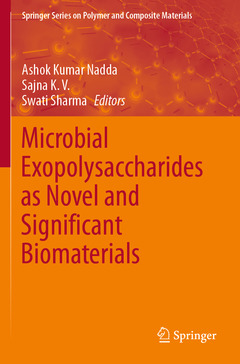Description
Microbial Exopolysaccharides as Novel and Significant Biomaterials, 1st ed. 2021
Springer Series on Polymer and Composite Materials Series
Coordinators: Nadda Ashok Kumar, K. V. Sajna, Sharma Swati
Language: English
Subjects for Microbial Exopolysaccharides as Novel and Significant...:
Publication date: 07-2022
339 p. · 15.5x23.5 cm · Paperback
Publication date: 07-2021
339 p. · 15.5x23.5 cm · Hardback
Description
/li>Contents
/li>Biography
/li>Comment
/li>
Microbial exoploysaccharides: An introduction.- Techniques used for characterization of microbial exopolysaccharides: A review.- Molecular basis and genetic regulation of EPS.- Molecular engineering of bacterial exopolysaccharide for improved properties.- Extremophiles: As a versatile source of EPS.- Pullulan: biosynthesis, production and applications.- Exopolysaccharides in drug delivery systems.- Exopolysaccharides in food processing industrials.- Microbial EPS as immunomodulatoryagents.- Novel insights of microbial exopolysaccharides as bio-adsorbents for the removal of heavy metals from soil and wastewater.- Applications of EPS in environmental bioremediations.- Cost-benefit analysis and industrial potential ofexopolysaccharides.
These books may interest you

Microbial Sensing in Fermentation 185.98 €



